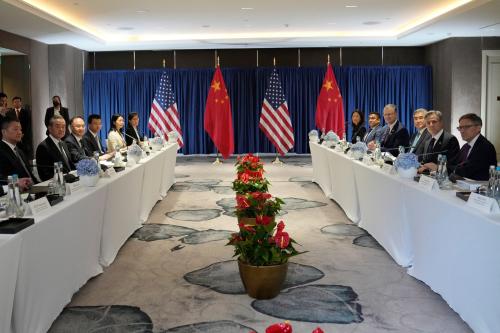Four years have passed since US President George W. Bush called for supporting democracy and freedom in the Middle East. The outcome is nothing. This tragic fact is not only because of the ability of authoritarian regimes, especially in the Arab region, to modernize their tools of tyranny and repression of political opposition, but rather because President Bush’s call to support democracy itself was a mere delusion to protect US interests.
Many examples around the world demonstrate the failure of betting on the United States as a partner in supporting democracy — Georgia, Pakistan and Libya are just a few examples. These three cases demonstrate that only interests, not values, control US foreign policy.
In Georgia, the United States has failed to protect one of its most important allies in Eastern Europe, President Mikheil Saakashvili, and left him prey to the Russian bear that could almost swallow him up. It is known that Saakashvili led the Rose Revolution in 2004 against former President Edward Shevardnadze. Saakashvili miscalculated the situation when he thought that the declaration of war against Russia would push the West, particularly the United States, to embrace and protect him, forgetting that the game of interests might be stronger than the US’ “soft” discourse about supporting democracy and human rights.
The US and European move, which came late, has not aimed to protect the “nascent democracy” in Georgia, but rather to curb the rising Russian influence so as not to threaten Western interests in Eastern Europe. Also, the Georgia-Russia war was not only a serious test of the credibility of the US in protecting its democratic allies, but also a test of the “authoritarian” ideological ability to vanquish “democracy.”
War has stressed the fact that “authoritarian” Russia has overcome “democratic” Georgia and its Western allies, because interests, not human values, determine the rules of the game. This is exactly the case in the Arab world, where considerations of stability and the strategic interests of the US prevail over the issue of supporting democracy and freedoms.
In Pakistan, President Pervez Musharraf, the main ally of the United States in the ‘war on terror,’ faced an awkward position and under parliamentary opposition pressure was forced to step down on Monday. Musharraf was betting on American protection, as he had done throughout the nine years since his military coup in 1999, when the US provided him with financial and military support to forestall any attempts to overthrow him, whether by Al-Qaeda and other hard-liners or through the political opposition represented in the Pakistan People’s Party, led by Benazir Bhutto, who was assassinated late last December. The most amusing comment I heard is that the US State Department considers what is taking place in Pakistan as “an internal matter” in which it should not interfere.
What happened a few days ago in Libya must also be contemplated carefully. The US signed an agreement paving the way for the resumption of full diplomatic relations with Libya. A deal was signed to establish a compensation fund for families of victims of the 1988 Lockerbie plane crash and 1986 Berlin ‘La Belle’ nightclub attack. Noticeably absent has been any talk about democracy or human rights in Libya.
These three cases terminate the democratic “delusion” that was promoted by the Bush administration over the past four years. Our peoples should struggle for their freedom, without waiting for assistance from the US, which has forsaken everybody to protect only its own interests.



Commentary
Op-edThe United States and the Democracy Delusion
August 19, 2008